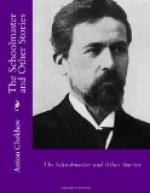All the way home the doctor thought not of his wife, nor of his Andrey, but of Abogin and the people in the house he had just left. His thoughts were unjust and inhumanly cruel. He condemned Abogin and his wife and Paptchinsky and all who lived in rosy, subdued light among sweet perfumes, and all the way home he hated and despised them till his head ached. And a firm conviction concerning those people took shape in his mind.
Time will pass and Kirilov’s sorrow will pass, but that conviction, unjust and unworthy of the human heart, will not pass, but will remain in the doctor’s mind to the grave.
THE EXAMINING MAGISTRATE
A district doctor and an examining magistrate were driving one fine spring day to an inquest. The examining magistrate, a man of five and thirty, looked dreamily at the horses and said:
“There is a great deal that is enigmatic and obscure in nature; and even in everyday life, doctor, one must often come upon phenomena which are absolutely incapable of explanation. I know, for instance, of several strange, mysterious deaths, the cause of which only spiritualists and mystics will undertake to explain; a clear-headed man can only lift up his hands in perplexity. For example, I know of a highly cultured lady who foretold her own death and died without any apparent reason on the very day she had predicted. She said that she would die on a certain day, and she did die.”
“There’s no effect without a cause,” said the doctor. “If there’s a death there must be a cause for it. But as for predicting it there’s nothing very marvellous in that. All our ladies—all our females, in fact—have a turn for prophecies and presentiments.”
“Just so, but my lady, doctor, was quite a special case. There was nothing like the ladies’ or other females’ presentiments about her prediction and her death. She was a young woman, healthy and clever, with no superstitions of any sort. She had such clear, intelligent, honest eyes; an open, sensible face with a faint, typically Russian look of mockery in her eyes and on her lips. There was nothing of the fine lady or of the female about her, except—if you like— her beauty! She was graceful, elegant as that birch tree; she had wonderful hair. That she may be intelligible to you, I will add, too, that she was a person of the most infectious gaiety and carelessness and that intelligent, good sort of frivolity which is only found in good-natured, light-hearted people with brains. Can one talk of mysticism, spiritualism, a turn for presentiment, or anything of that sort, in this case? She used to laugh at all that.”
The doctor’s chaise stopped by a well. The examining magistrate and the doctor drank some water, stretched, and waited for the coachman to finish watering the horses.
“Well, what did the lady die of?” asked the doctor when the chaise was rolling along the road again.




